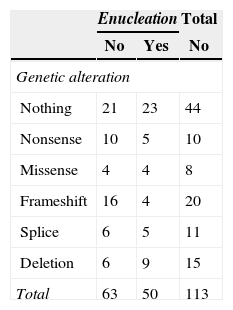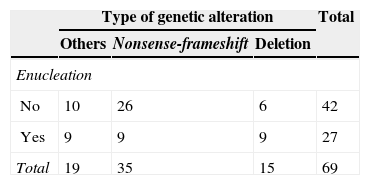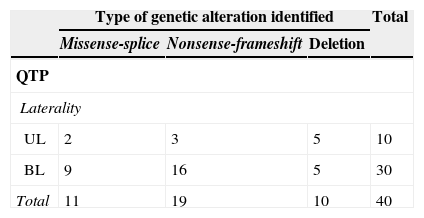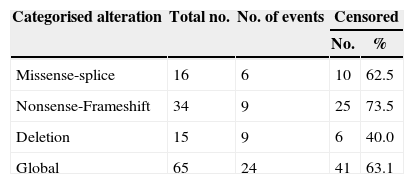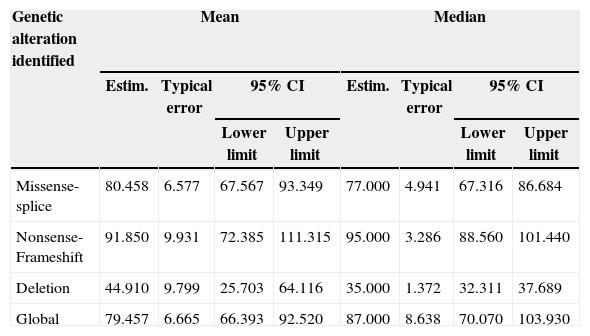To analyse the genetic alterations identified in the RB1 gene in retinoblastoma patients who do not respond to systemic chemotherapy.
MethodsA genetic analysis was performed on 115 patients with retinoblastoma, 40 of whom had received systemic chemotherapy, and 29 of them had bilateral disease. Descriptive and retrospective study. Non-responders were considered as patients who are finally enucleated.
ResultsPatients with deletion type mutations are those with less preservation of the eyeball (Pearson chi-square, P=.055). Patients with an impaired nonsense-frameshift type are more likely to preserve the eyeball. Of the 3 patients who had undergone bilateral enucleation, 2 of them had deletions and one missense alteration. Survival analysis (Kaplan–Meier curve) shows that patients with deletion type mutations are more resistance to chemotherapy, are suffering higher rates of enucleation, and for a shorter period of time (log rank [Mantel–Cox] with a significance level of P=.053), which are also associated with increased rate of being bilateral.
ConclusionsPatients with a genotype show increased resistance to chemotherapy should be evaluated more closely and treated with various therapeutic weapons early. Patients that have deletions in the RB1 gene are at increased risk of chemoresistance. It is likely that other genetic alterations other than RB1 gene may be related to tumour aggressiveness and treatment resistance.
Analizar las alteraciones genéticas identificadas en el gen RB1 en los pacientes con retinoblastoma no respondedores a quimioterapia sistémica.
MétodosSe seleccionó a un total de 115 pacientes con retinoblastoma con análisis genético realizado, 40 de los cuales habían recibido quimioterapia sistémica; 29 de ellos presentaban una enfermedad bilateral. Estudio descriptivo y retrospectivo. Consideramos no respondedores a los pacientes que finalmente son enucleados.
ResultadosLos pacientes con mutaciones del tipo deleción son los que presentan menor conservación del globo ocular (Chi-cuadrado de Pearson; p=0,055). Los pacientes que presentan una alteración del tipo nonsense-frameshift tienen más posibilidades de conservar el globo ocular. De los 3 pacientes que han experimentado enucleación bilateral, 2 de ellos presentaban deleciones y uno alteración del tipo missense. El análisis de supervivencia (curva de Kaplan-Meier) evidencia que los pacientes con mutaciones del tipo deleción son los que presentan mayor resistencia a la quimioterapia, son los que sufren mayor tasa de enucleaciones y en un menor periodo de tiempo (Log Rank [Mantel-Cox] con nivel de significación de p=0,053); son, además, los que se asocian con mayor tasa de bilateralidad.
ConclusionesLos pacientes con un genotipo que presente mayor resistencia a la quimioterapia deben ser evaluados más estrechamente y tratados con varias armas terapéuticas de forma precoz. Los pacientes que presentan deleciones en el gen RB1 presentan mayor riesgo de quimiorresistencia. Es probable que otras alteraciones genéticas distintas de las del gen RB1 puedan tener relación con la agresividad del tumour o la resistencia al tratamiento.







